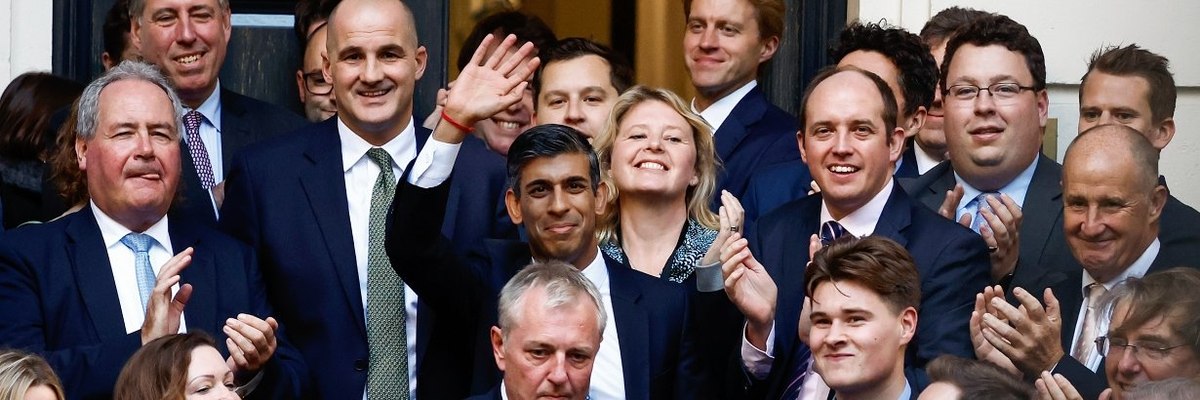Only a third think ethnic minority representation in the Commons has improved in recent years
As Rishi Sunak becomes Britain’s first racial minority prime minister, a new YouGov survey of Black, Asian and Minority Ethnic adults reveals that the majority (59%) feel that MPs are not representative of the wider population.
There, is however, significant variation between ethnic groups: less than half of those with Pakistani heritage (47%) feel MPs are not representative, compared to 71% of those categorised as ‘other ethnicity’ (referring to Arab or any other ethnic group).
The representation of people from a minority ethnic background in politics has risen in recent years. The number of MPs from minority ethnic backgrounds has increased at each general election since 1987. Following the 2015 general election that figure stood at 41, rising to 52 at the 2017 election and 65 at the 2019 election. Ethnic minority MPs now number 10% of all MPs.
When asked if they think ethnic minority representation has improved among MPs in the last few years, 34% of ethnic minority Britons say that it has. A further 28% say there has been no real difference, and 14% saying it has generally worsened.
Almost twice as many ethnic minority Britons aged 65 and over (51%) feel the situation has improved across Westminster compared to those aged 18 to 24 (27%). Those of Pakistani lineage are the least likely to feel ethnic minority representation has improved (19%) and those classing themselves as ‘other ethnicity’ are the most likely to (48%).
Of the 65 ethnic minority MPs in the Commons, 41 are Labour (up from 23 in 2015) and 22 are Conservatives (up from 17). This equates to 20% of all Labour MPs originating from ethnic minority backgrounds compared to only 6% of MPs in the Conservative party.
At a party level, a third of ethnic minority adults (32%) feel ethnic minority representation has improved among Conservative MPs and a quarter (26%) say the same of Labour MPs. Four in ten (42%) of both Indian Britons and those of ‘other ethnicity’ say that the situation has improved among MPs in the Conservative party compared to a quarter (25%) of those defining themselves as ‘other Asian’. Twice as many Black and Indian Britons (30%) say ethnic minority representation has improved among Labour MPs compared to those from an ‘other Asian background (15%).
Only a third of ethnic minority Britons support all-ethnic-minority shortlists for selecting MPs
While it is clear ethnic minority Britons tend to see the Commons as unrepresentative, only a third (32%) actively support the idea of choosing MPs from lists of preferred candidates from minority backgrounds. Advocates of this approach include Labour leader Keir Starmer, however an attempt to permit this in law failed to work its way through Parliament.
A further 30% are ambivalent, neither supporting nor opposing, while 21% are actively opposed.
Older ethnic minority Britons are much more opposed to this idea than their younger peers, with a third of those aged 65 and over (33%) opposing it but only 16% of 18-24 year olds against the idea.
But is it important to achieve a balance of candidates by ethnicity in the first place? Ethnic minority Britons are divided on this question, with 40% considering it important compared to 45% who do not.
Black Britons and those of ‘other ethnicity’ are the most likely to see an ethnicity balance among parliamentary candidates as important, by 45% to 41% in the case of the former and 45% to 37% in the case of the latter.
Younger ethnic minority Britons are also more likely to see it as important than their elders: 39% of 18-24 year olds say it is important to balance the ethnic composition of parliamentary candidates, compared to only one in five aged 65 and over (21%).
Dissatisfaction with politics is widespread among ethnic minority Britons
The survey also reveals that dissatisfaction in politics is widespread among ethnic minority Britons. Three-quarters (77%) say their level of satisfaction with politics is low to none compared to just 15% who are highly satisfied. Almost nine out of ten aged 65 (88%) and over find themselves dissatisfied with politics in Britain compared to six in ten of 18-24 year olds (60%).
Engagement in politics is fairly evenly split with 45% who say they are engaged compared to 48% who say they aren’t. Among specific ethnic groups, just 38% of people categorised as ‘other Asian’ and 39% of Pakistani Britons say they are engaged in politics, compared to 51% of Indian Britons and 58% of those who class themselves as ‘other ethnicity’.
Of those ethnic minority adults who say they’re not engaged in politics, the main reasons include lack of trust in politicians (49%), not relating to anyone in politics at the moment (30%) and not thinking they can have any real impact (29%). A quarter (25%) don’t feel motivated to participate with 23% saying the issues they’re interested in are being ignored and 22% don’t know enough about it.
Photo: Getty










